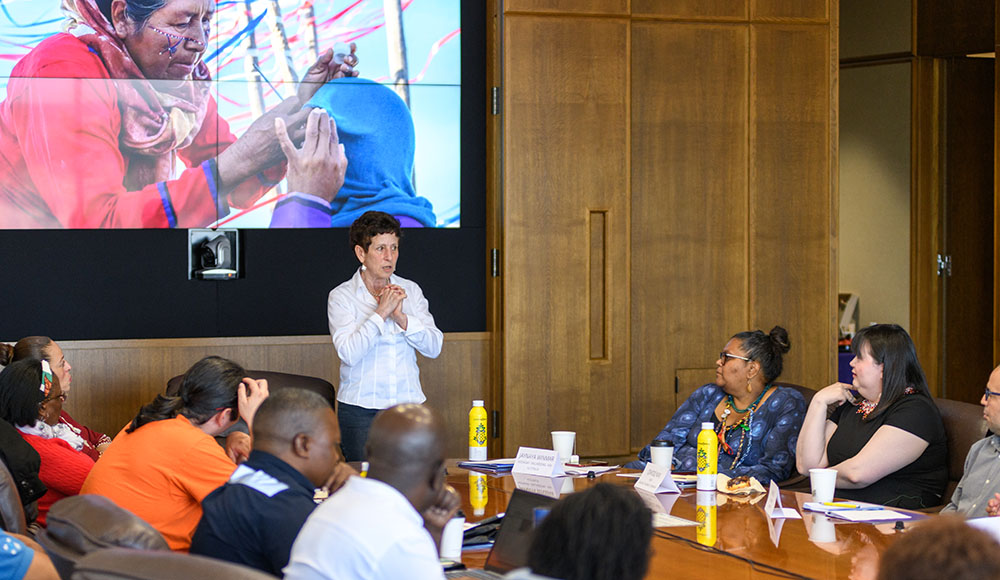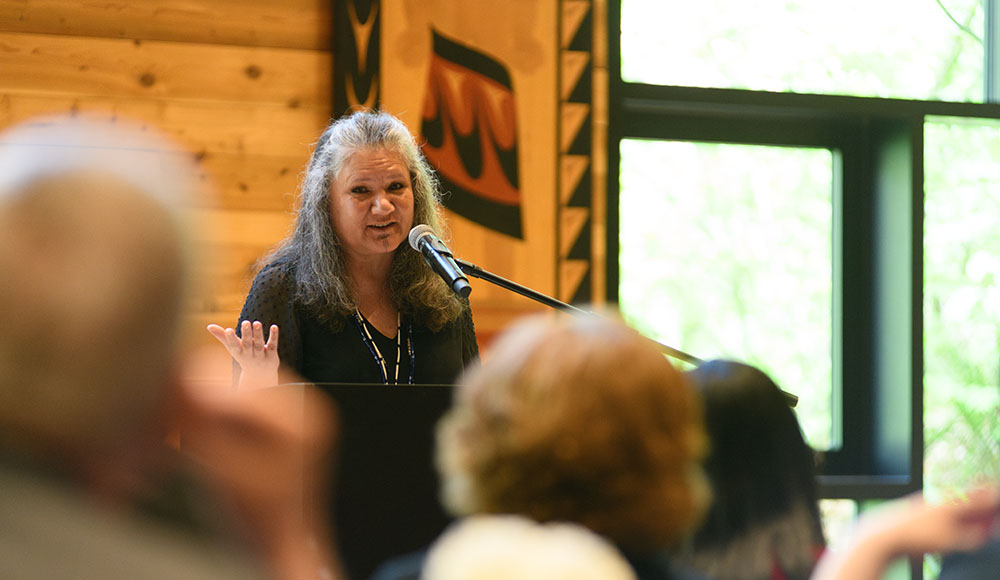UW Continuum College's International and English Language Programs (IELP) feature a variety of curricula and partnerships, including global business certificates, university preparation and study-abroad programs. One such partnership, the Distinguished Humphrey Fellowship Program, enables Fellows from around the world to share their singular expertise with each other as well as colleagues at the UW, embodying the cross-cultural collaboration that defines IELP.
When tackling massive global issues like climate change, hunger, war and poverty, “the world is struggling,” says Nadine Fabbi, director of the University of Washington’s Canadian Studies Center. “We’re lacking balance in how we think about these issues, and a huge part of that lack of balance is that we haven’t successfully worked with Indigenous people to integrate their knowledge with approaches from the traditional Western world.”
One way to integrate Indigenous and Western traditions is through the concept of Etuaptmumk or “two-eyed seeing.” A guiding principle popularized by Mi’kmaw Elder Albert Marshall, the aim of two-eyed seeing is simple but profound: to see from one eye with Indigenous knowledge, the other with Western knowledge, and to integrate these two perspectives for the benefit of us all.
The notion of two-eyed seeing was put into practice on the Seattle campus in May 2024, when the University of Washington Continuum College and the Canadian Studies Center in the Henry M. Jackson School of International Studies, in collaboration with the Native American Law Center, hosted the 2024 Distinguished Humphrey Fellowship Program on the Rights of Indigenous Peoples.

Bringing together 19 professionals from 17 countries, the opportunity to host this year’s program was a particular honor for the UW: it was the first Humphrey Fellowship program to focus on Indigenous rights. The visit to UW provided global leaders in the Indigenous rights movement a rare opportunity to collaborate across borders to share strategies and advice on how to advocate for the inclusion of Indigenous perspectives in their respective communities.
“The presentations throughout the program were a useful reminder of the common human journey Indigenous people are on — and how advances in one country can support progress in another,” says Jacqui Caine, executive director of Te Runanga o Ngai Tahu, the governing body of the Māori iwi (tribe) Ngāi Tahu in Aotearoa New Zealand.
Finding Common Ground
Designed to build relationships between Americans and international counterparts, the Distinguished Humphrey Fellowship Program is a senior-level executive and leadership program supported by the Institute of International Education and the U.S. Department of State’s Bureau of Educational and Cultural Affairs. The two-week program kicked off at the wǝɫǝbʔaltxʷ – Intellectual House and included a week in Seattle, small-group visits to other North American tribal communities and capstone sessions in Washington, D.C.
"It was a truly enriching experience for me to delve into the world of Indigenous Peoples, all gathered in one place, engaging in fruitful interactions."
As the Humphrey Fellows got to know each other, they saw they face many of the same issues, whether they’re dealing with them in Morocco or Tuvalu. That reminder of the bigger picture can help ground fellows when they’re back home, deep in the work.
“One of the things that was most inspiring to the fellows was how much it strengthened their own work to be with colleagues working in the same fields — struggling enormously in some cases and enjoying tremendous successes in other cases — who were part of this international community,” Fabbi explains. “That is so important because often when you’re sitting alone in your office, stuck in the work you’re doing, it’s hard to have a perspective on the impact of the work.”
“It was a truly enriching experience for me to delve into the world of Indigenous Peoples, all gathered in one place, engaging in fruitful interactions,” adds Ritu Thapa, a Nepalese lawyer for the Indigenous Women Legal Awareness Group.
Creating Connections
These “fruitful interactions” were the primary goal of the 2024 Distinguished Humphrey Fellowship Program: to facilitate conversations and collaboration about Indigenous rights that leave a lasting impact both at the UW and in the Fellows’ home countries.
The UW shared Indigenous knowledge and experiences from the Pacific Northwest, including presentations from local Indigenous leaders about the Tribal Canoe Journey and First Nations herring protectors, with the Humphrey Fellows, shedding light on the larger systemic issues harming Indigenous people.

“Everyone who attended walked away with a broader understanding of the challenges faced by Indigenous peoples around the world and more awareness of the structural inequities and the lasting legacies of colonialism,” says Sandra Janusch, UW Continuum College associate vice provost. “At the same time, we all felt hopeful we played a small part in helping Indigenous people from around the world have this opportunity to network and build relationships with each other.”
Bringing Ideas and Networks Home
"This has created a global network I would’ve never had without the program. It has brought a new family into my life that is irreplaceable."
After the two-week flurry of activity across North America, the Humphrey Fellows must return to the realities, particularities and peculiarities of their work. But, armed with the new knowledge, contacts and lessons they’ve gained from their time as Fellows, these activists, lawyers, advocates and diplomats returned home energized with “action items” eager to show their colleagues.
Unaisi Nawalowalo — a senior program specialist at the Fiji iTaukei Trust Fund Board (TTFB), explains that the presentations on 500 years of international jurisprudence and the basic and human rights framework “have challenged my understanding of Fiji’s legal framework on Indigenous issues. Indigenous lawyers and law firms in Fiji should prioritize and focus on advancing Indigenous rights through the rule of law, and also must understand the historical trajectory and contemporary issues concerning Indigenous rights.”

Loretta Ross discusses the insights she'll bring home.
Jacqui is also ready to incorporate the ideas she learned into her work back in New Zealand.
“Key actions for me are sharing my learnings with my own tribe and leveraging instruments like the Organization for Economic Cooperation and Development (OECD) Guidelines for Multinational Entities in my own work — and the importance of revisiting, revitalizing and recording traditional knowledge,” Caine says.
Just like that, the ideas brainstormed and discussed in the University District of Seattle may become the policies and initiatives implemented in Greenland, Fiji or Guatemala — exactly the kind of lasting cross-cultural collaboration that is the raison d'etre of IELP.
“The knowledge and wisdom of my colleagues has been encouraging and uplifting,” says Loretta Ross, treaty commissioner for the Treaty Relations Commission of Manitoba, where she represents 62 of 63 of the province’s First Nations. “This has created a global network I would’ve never had without the program. It has brought a new family into my life that is irreplaceable.”
